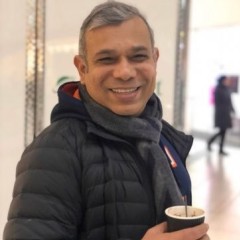In the series ‘Untangling Disinformation,’ National Public Radio (NPR) published an article, ‘She was a Yoga guru. Then she embraced QAnon conspiracy theories.’
The central thesis of this article revolves around what the author thinks is a causal relationship between the practice of Yoga and the “conspiracy theories” around covid vaccines and other government mandates.
The NPR author follows a Los Angeles, CA, Yoga teacher named Guru Jagat. Born Katie Griggs, Jagat ran her Kundalini Yoga studio in LA’s Venice neighborhood. Her students included celebrities like Alicia Keys and Kate Hudson. Students considered her “something of a contradiction” who wore “white flowing clothes… could chant in Sanskrit… swore profusely and talked about sex and fashion in class.”
Jagat believed, we are told, Covid was being sprayed in airplane chemtrails. She also held in-person maskless Yoga classes in defiance of local stay-at-home orders, practices NPR cites as proof that she lost her mind. Jagat passed away unexpectedly at 41 in August of 2021 and became a saint-like figure to many of her followers.
The author of the NPR article makes a series of unfounded claims about Yoga. In doing so, the author finds herself entangled in disinformation and reductionist arguments against Yoga and Hinduism.
NPR and Pattern of Disinformation
Like many American media outlets, NPR has been part of the disinformation machine for the last few years. It pushed the fake Russian Collusion story suggesting the 2016 US presidential elections were compromised by Russian government interference. This conspiracy theory was the handiwork of the losing presidential candidate of the 2016 elections Hillary Clinton and her campaign. The US media amplified this cooked-up story for years.
NPR was also part of the band of media outlets that spread misinformation about one of the most consequential news stories weeks before the 2020 presidential elections. It refused to accept the existence of Hunter Biden’s incriminating laptop. “We do not want to waste our time on stories that are not really stories,” said Terrence Samuels, NPR’s news editor.
Hunter is the son of the current US President, Joe Biden, who was in a tight race against the incumbent, Donald Trump, in the 2020 presidential election. According to a study, nearly 80 percent of Americans believed that a “truthful” coverage of the Hunter Biden story would have changed the outcome of the 2020 presidential elections.
NPR’s Faulty Coverage of India and Hindus
NPR’s liberal bias is not secret. In his October 2017 New York Post piece Ken Stern, the former CEO of NPR writes:
“Most reporters and editors are liberal – a now dated Pew Research Center poll found that liberals outnumber conservatives in media by some 5 to 1, and that comports to my anecdotal experience at National Public Radio.”
Similarly, NPR’s official ombudsman Jeffrey Dvorkin also admitted a liberal bias in NPR’s talk programming.
But that is not it. Time and again, NPR’s staff have displayed their utter lack of understanding about India, its people, texts, and traditions. For example, one of NPR’s India bureau producers, Furkhan Khan, shared a highly offensive post on her Twitter timeline:
“Indians gave up Hinduism, they will also be solving most of their problems what with all the piss drinking and dung worshipping. [sic]”


Khan later ‘resigned’ from her job, and NPR issued an apology.
Another NPR India bureau reporter, Lauren Frayer, shared a train-looting video on her Twitter timeline. The footage showed looted and busted Amazon and UPS packages, unused covid tests, etc., littered around the train tracks in Los Angeles, CA. Frayer had commented:
“At first glance, I thought this was India.”


After much outrage, Frayer deleted her tweet.
Yoga and the Vedas
One has to see NPR’s coverage of “Yoga” and “disinformation” in the backdrop of the preceding discussion.
Yoga is a Darshana, a philosophy. While a complete exposition of the Yogic philosophy and a review of the Yogic literature with the Indian Knowledge Tradition is beyond the scope of these pages, I shall endeavor to provide a quick summary.
Yoga is one of the six Hindu schools of philosophy: Nyaya, Vaisheshika, Yoga, Sankhya, Mimamsa, and Vedanta. These schools of philosophy have roots in the Vedas, the oldest body of literature known to humankind.
Yoga is a Sanskrit word that means ‘union.’ Yogic scholars define Yoga as the union of mind and ‘Self’ – (atman, one’s consciousness). Hindu tradition makes a clear distinction between mind and Self. While the mind has worldly attributes – judgment, language, memory, etc., the Self is pure awareness. With Yoga, the mind and the Self become one and lose the duality. This union is also the state of sat-chit-anand – eternal bliss.
Before a Yoga practitioner can gain an understanding of the mind, it is crucial to gain an understanding of the body. This is why part of the practice of Yoga includes asanas – the physical posture. The practice of Yoga also includes pranayama (breathing exercises), pratyahara (in-drawing one’s awareness), dharana (concentration), dhyana (meditation), and samadhi (meditative consciousness) (Subhash Kak, Mind and Self: Patanjali’s Yoga Sutra and Science).
Veda means knowledge. Veda is the science of consciousness. Vedic literature is considered the most authentic source of knowledge in the Indian Intellectual Tradition. The Vedas (Rig, Atharva, Sama, and Yajur), as shruti, are the most sacred Hindu texts. They are called apaurusheya, not created by humans.
Veda is the knowledge, and Yoga is the practice of that knowledge. The practice of Yoga is about self-knowledge, which in turn requires a deep understanding of the Vedas.
Patanjali (2-4th century BCE) compiled the Yogasutra – one of the earliest authoritative texts on the theory and practice of Yoga. The practice of Yoga, however, is much older. Patanjali was the compiler of the existing Yogic theories and practices. There are mentions of Yoga in the Mahabharata. The Bhagawad Gita speaks of four Yoga – karma, gyana, bhakti, and dhyana.
Mask-Vaccine Compliance and Yoga
The major gripe of the NPR piece is that Yoga promoted “conspiracy theories” and non-compliance against the government’s mask, stay-at-home, and vaccine mandates. NPR claims that “everything is connected, nothing happens without a purpose, and nothing is what it seems is central to both yoga philosophy and conspiratorial thinking.”
The notion that everybody needs to be vaccinated against covid, according to Martin Kuldorff and Jay Bhattacharya, is “as scientifically baseless as the idea that nobody does.” We now know that covid vaccines have no societal benefit beyond personal protection. Vaccinated people both get reinfected and spread the virus to others. Natural immunity conferred by infection is axiomatic. Studies also suggest that the risk of myocarditis after two doses of mRNA vaccine is much higher in young males than initially acknowledged.
No scientific RCT (Randomized Control Trial) has shown any significant benefit of community masking against the spread of covid. We also know that non-pharmacological interventions, such as stay-at-home orders and lockdowns, were arbitrary and had no significant bearing on the covid spread. These unscientific and authoritarian mandates have inflicted more short and long-term harm to society than delaying inevitable infection. So, the question to NPR is this: what moral, ethical, and scientific justification did NPR have in advocating one-size-fits-all medical interventions?
The idea that “everything is connected” is central not only to the Hindu (and thus Yoga) philosophy. It is also one of the tenets of modern scientific ideas – quantum mechanics or the study of the micro-world states. Quantum mechanics illustrates that what we think of reality is not so. Our human brains trick us into believing in the idea of separation when nothing in this universe exists in isolation.
Erwin Schrödinger, the Nobel Prize-winning physicist and the discoverer of quantum mechanisms, claimed that his ideas about quantum mechanics were derived from the Hindu philosophical literature, the Upanishads.
The thinking that ‘truth is just in the eye of the beholder’ is quintessential to Hindu pluralism. This pluralism is derived from the Rig Vedic hymn (1.164.46) ekam sad vipra bahudha vadanti (there are many truths but one Reality). This notion of plurality provides Hindus with a framework to accept and respect other religious traditions. Abrahamic traditions lack such a framework.
The idea that compliance against government mandates has anything to do with Yoga (and Hinduism) is entirely baseless. A country where Yoga is practiced natively as part of the thousands of years old cultural tradition had one of the highest mask compliance, as this Wall Street Journal report would indicate. India also is one of the most highly vaccinated countries in the world. India has administered over 2 billion doses of covid vaccines without coercive mandates.
The Disconnect
To understand a complex system such as Yoga, one needs to see it within the parameters of the Indian Knowledge Tradition. “It is foolish to draw general lessons about Yoga from one person’s life story,” said Subhash Kak while commenting on the NPR article. Kak is a Regents Professor of Electrical and Computer Engineering at Oklahoma State University in Stillwater. “One should not forget that Yoga is the way of self-knowledge and wisdom, requiring ethical preparation and discipline, that is open to all.”
According to David Frawley (Pandit Vamadeva Shastri, a renowned Yoga scholar), Yoga is a sadhana tradition. Sadhana is an exercise performed with awareness, discipline, and spiritual growth. This sadhana confers the adhikara, the authority, to the practitioner to offer commentary on Yoga. Unless someone has done sadhana, says Frawley, “they shouldn’t be commenting upon Yoga, except as an intellectual exercise which is what we have today.”
There are glaring differences between the native Hindu and non-native understanding the Yoga. There are also fundamental differences in ontology and epistemology, the nature of the divine, the notion of time, etc., between the native Indian and the non-native outsider traditions.
One obvious thing to do to reconcile these differences would be to consult practitioners and scholars from within the tradition. NPR, in its profound journalistic judgment, has failed to do so. Readers are encouraged to undertake their research to sharpen their understanding of Yoga and the Indian Knowledge Tradition.
Join the conversation:


Published under a Creative Commons Attribution 4.0 International License
For reprints, please set the canonical link back to the original Brownstone Institute Article and Author.









